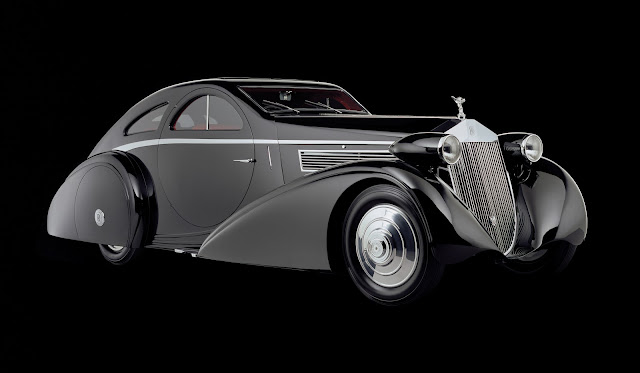Originally the car was a 1925 Rolls-Royce Phantom I with a body built in 1934 by Jonckheere of Belgium. Like all other prewar Rolls-Royce motorcars, this Phantom I was delivered new in chassis-only form to a coachbuilder. Hooper & Co. was the chosen body maker and in 1925, the completed vehicle was delivered with cabriolet coachwork to its first owner, a Mrs. Hugh Dillman of Detroit. Mrs. Dillman reportedly did not like the car and it appears never to have left England.
The Rolls-Royce was purchased by the Raja of Nanpara before being passed on to an unknown number of other owners and by 1932 was seen in Belgium. Two years later its then owner sent the car to Jonckheere of Belgium to be stripped of its cabriolet body and fitted with fashionably aerodynamic coachwork complete with twin sunroofs, a large fin, a sloping radiator shell, and round doors.
Although the design was controversial and not highly regarded by most Rolls-Royce aficionados, the car was well received by Concours d’Elegance judges of the day and was reported to have taken a Prix d’Honneur at the August, 1936 Cannes Concours d’Elegance.
The prize winning car then passed through the hands of several other owners, and was observed in Bar Harbor, Maine before World War II being driven by a chauffeur who was supposedly so obese, that he could not get out of the car to assist his employer to disembark. The Round Door Rolls was next discovered in the 1950’s, in New Jersey, in a junk yard.
It is not known who rescued the car from being scrapped, but East Coast entrepreneur Max Obie eventually acquired the unusual Rolls-Royce and had it refurbished. Obie would take it to shopping malls, making claims that the car had been owned by royalty and charged admission for people to look at it.
In the Spring of 2001, the Peterson Automotive Museum took possession, and Mr. and Mrs. Petersen decided to bring the car back to its concours winning glory. Every component was removed, checked for wear and authenticity, then reconditioned or replaced as needed. The car was painted black which highlights its subtle contours and striking profile.

















